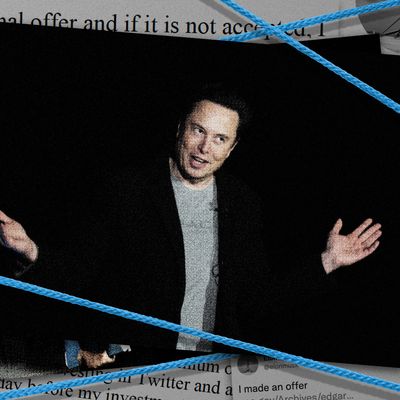
Among the billions of data points up for consideration in the Twitter v. Musk trial, there is nothing quite as volatile as the whistleblower lawsuit filed by the social-media company’s former head of security. The 84-page complaint, made public last week, is a broad indictment of how the company is run and how unsafe it is for its users. (Twitter broadly denies the claims, with Twitter CEO Parag Agrawal calling it “a false narrative that is riddled with inconsistencies.”) In the week since its filing, Elon Musk has seized on the complaint as a new justification to pry open Twitter’s data, though to muted effect.
Now he’s constructed a new legal argument to blow up his agreement to buy Twitter. He appears to be abandoning his legal theory that Twitter is riddled with unreported spambots for a new theory with the whistleblower suit as its centerpiece.
In a filing made public Tuesday, Musk commandeers the accusations made by Peiter “Mudge” Zatko into a new justification. He now claims the Twitter board defrauded him.
The crux of the case here is that Zatko told Twitter’s CEO and the board about a bunch of security problems, including its issues complying with a 2011 Federal Trade Commission settlement to better its security. This had huge potential to be troublesome for the company since it could result in billions of dollars in fines. Other problems flagged by Zatko include its overall weak security and allegations that it doesn’t pay vendors for their technology and that it employs Indian government spies.
This allows Musk to say the board knew about these problems but didn’t disclose them to him. Essentially, Musk is arguing that, by letting him think Twitter’s share price isn’t bogged down by spies and giant security holes, the company committed fraud. “These allegations, if true, demonstrate that Twitter has breached the following provisions of the Merger Agreement,” according to the filing.
The filing, which was dated August 29, really is a new direction for Team Musk here. The words bot or spam don’t appear at all. Why not? It was a losing argument. The judge in the case, Kathaleen St. James McCormick, called the discovery strategy on that argument “absurdly broad” and boxed Musk into an increasingly narrow frame.
Musk can make any number of arguments he wants in order to pry himself out of the deal. Ann Lipton, a Tulane law professor who’s been dissecting this case on Twitter, believes this is a bid for Musk’s side to amend the complaint in Chancery court. She also noted today that the judge might have to move the trial back to allow for a new round of discovery if Musk gets to try a whole new argument.
But where is Zatko in all this? On Monday, his representatives sent out a statement distancing the hacker from Musk. Musk had already subpoenaed him for a deposition. While he would sit for the deposition, Zatko said, his participation is “involuntary.”
The statement also said, “He did not make his whistleblower disclosures to the appropriate governmental bodies to benefit Musk or to harm Twitter, but rather to protect the American public and Twitter shareholders.”
When Zatko’s complaint was made public, people wanted to know if Musk had known it was coming. The opening pages of the complaint were written in such a way as to leave the impression it supported Musk’s theory that there were more bots on the platform than Twitter let on. But later in the filing, Zatko knocked down those claims.
I also noticed in the suit that Zatko claims he hasn’t spoken to anyone with a financial interest in Twitter about his allegations. Last week, I spoke with Zatko’s lawyer, John Tye of Whistleblower Aid, about the suit. He said that, because of confidentiality issues and the ongoing government probes, he wouldn’t talk directly about the allegations in the suit. Could there have been intermediaries for Musk who’d learned there was an explosive suit brewing? “The answer is no,” Tye told me. “He’s only filed lawful disclosures with law-enforcement agencies, the SEC, FTC, Department of Justice, and congressional committees of jurisdiction. Those are the only people who he’s been in touch with, except with us, his lawyers.”
The suit, then, is really a road map for investigators to try to fix a company that’s a giant target for hackers and scam artists and to possibly change the law around how social-media companies protect their users. “He wants Congress to investigate it and, if warranted, legislate to address some of these issues,” Tye said. Zatko’s particular concern was the security issues. “The user base being informed about some of these issues is crucial for an informed, engaged internet public going forward.”
Even as Musk tries to co-opt the whistleblower, this actually points to bigger problems for him down the road. Think about it this way: Zatko wants government scrutiny to overhaul Twitter’s safety. His suit doesn’t really do anything to help Musk’s bot claims. The new theory about fraud still has to pass a high bar in order for the courts to terminate the deal. If things keep breaking Twitter’s way for the next seven weeks, the Delaware Chancery Court could not only force Musk to swallow a $44 billion deal, but it could also kick off years of government intervention, something Musk has never been particularly happy about before.































